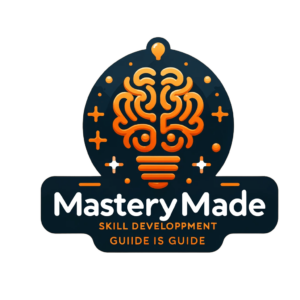As we engage in the relentless pursuit of professional growth, we often find ourselves seeking a compass to navigate the complex pathways of career progression. It’s in this journey that Skill Development Guides emerge as beacons of enlightenment, illuminating the route to personal and professional mastery. These guides are not mere collections of advice but are strategic tools that empower us to unlock an unprecedented level of success in our careers.
Whether you are stepping onto the first rungs of your career ladder or aiming for the zenith in your field, the path to career advancement is invariably paved with continuous learning and skill refinement. In an era where change is the only constant, embracing Skill Development Guides is not just a choice, but a necessity for those who aspire to excel and evolve within their professional spheres.
Together, let us embark on a transformative adventure, where every page turned within these guides brings us one step closer to the apex of our career goals. With commitment and savvy use of strategic resources that enhance our skills, we unlock new realms of possibility. Our ambition is the map, our perseverance the vehicle, and Skill Development Guides the fuel that will drive us towards lasting career triumph.
Key Takeaways
- Embrace continuous learning for sustained professional growth.
- Utilize Skill Development Guides to unlock higher job performance and career opportunities.
- Recognize the imperative of skill enhancement for maintaining a competitive edge.
- Initiate a personal journey towards skill mastery that aligns with career aspirations.
- Transform professional journeys by strategically leveraging guides for skill and career advancement.
Embarking on Your Skill Development Journey
As we step into a world where the professional landscape constantly evolves, it has become increasingly crucial to learn new skills and engage in continuous professional development. It’s not just about keeping pace with industry trends; it’s about enhancing our capabilities to deliver exceptional performance and value in our roles. As we explore the essence of skill building, we’ll unearth its profound effect on both personal and professional spheres.
Understanding Skill Development and Its Importance
Professional development starts with an acknowledgement of skill as a multifaceted entity. It encompasses an array of competencies, from the proficiency in contemporary digital tools to the interpersonal finesse that smoothens workplace communications. By endorsing the idea that skills can be honed through conscious effort, we set the foundational belief that underpins thriving careers.
Real-world examples are replete with narratives of individuals who have climbed the career ladder by adopting a steadfast commitment to skill development. These stories not only inspire but also serve as tangible proof that when we grow our skill set, the possibilities for advancement are limitless.
Setting Goals for Professional Development
The cornerstone of any skill-building journey is a clear and actionable plan. By setting SMART goals—specific, measurable, achievable, relevant, and timely objectives—we create a roadmap for success. Employing this framework, let’s delve into examples of objectives one could strive for:
- Attain proficiency in a new software relevant to your industry within three months.
- Enhance public speaking skills by presenting at least once a month.
- Develop leadership abilities by volunteering to lead a project team.
Achieving these goals can significantly impact your ability to compete and prosper in your professional environment. As you jot down your targets, envision yourself thriving with a more robust skillset. The act of skill building is an investment that consistently pays dividends over the course of your career. Through dedication and a zest for learning, you are setting the stage for a brighter, more competent tomorrow.
The Role of Skill Development in Career Advancement
In today’s fast-paced professional landscape, the importance of skill enhancement cannot be overstated. As we navigate through various industries and job roles, the need to continuously improve skills emerges as a non-negotiable aspect of career advancement. Whether you’re eyeing a promotion, hoping to negotiate for a higher salary, or seeking to broaden your career horizons, investing time and effort into skill development is crucial.
Staying abreast of the latest industry developments and technological advancements entails a commitment to learning and growth. By embracing a culture of ongoing professional education, you set the stage not only for advancement but also for innovation within your field. Let’s take a closer look at how skill development directly impacts your career trajectory.
- Acquiring new skills can open up doors to higher-level positions that require specialized knowledge.
- Improving existing skills ensures that your expertise remains sharp and competitive.
- Fostering a versatile skill set enables you to pivot across roles and industries with ease.
Additionally, employers frequently recognize and reward proactive learners with career advancement opportunities. This is evident in the way skill-building is linked to professional recognition and financial gains. To better illustrate this point, consider the following table, which showcases the relationship between skill enhancement and various aspects of career growth.
| Skill Development Area | Potential Career Impact | Examples |
|---|---|---|
| Leadership Abilities | Promotion to Management Roles | Mentoring programs, Leadership workshops |
| Technical Expertise | Eligibility for Specialized Projects | Certifications in latest technologies |
| Communication Skills | Improved Collaborative Efforts | Public speaking courses, Writing seminars |
| Creative Problem-Solving | Opportunities in Strategy and Innovation | Design thinking workshops, Creative brainstorming sessions |
Case studies from leading companies like Google and Microsoft reveal that individuals who make a point to improve skills are often the first in line when opportunities for career advancement arise. This highlights the weight that skill development carries in terms of employer perception and the value placed on employees who display a commitment to lifelong learning.
In conclusion, skill development plays a fundamental role in shaping your career. It’s the engine that powers growth, unlocks opportunities, and ultimately, can lead to a fulfilling and prosperous professional life. Remember, every workshop attended, course completed, and certification earned is a stepping stone to elevating your career to new heights.
Incorporating Skill Development Guides into Your Routine
As we continue to strive for excellence in our professional development, we recognize the necessity of integrating Skill Development Guides into our daily regimen. Creating such a routine is not just about dedication, it’s about smart planning and understanding how the right habits can significantly impact our growth trajectory.
In making skill development a habitual part of our lives, we’ve amassed a variety of skill development tips that have proven instrumental for many who are serious about their professional journey:
| Time Management Tips | Learning Environment Tips | Motivation Sustenance Tips |
|---|---|---|
| Set specific hours weekly dedicated to learning | Organize a quiet, clutter-free study area | Regularly set and review attainable goals |
| Utilize breaks or commutes to read or listen to educational content | Ensure good lighting and comfortable seating | Celebrate small victories to maintain enthusiasm |
| Limit distractions like social media during learning sessions | Keep all learning materials and resources within easy reach | Join a community or group focused on similar skills |
To make this advice actionable, start by identifying periods in your day when you’re least occupied and could engage in learning activities. Even 15 minutes spent mastering a new concept or strategy can accumulate to substantial knowledge gains over time.
- Reassess your weekly schedule to pinpoint ideal learning times.
- Prepare your resources in advance – whether they are books, articles, online courses, or Skill Development Guides.
- Track your progress to keep yourself accountable and to visualize your improvement.
Remember, consistency is everything. It’s about weaving skill development into the fabric of your daily life so that it becomes second nature—a part of who you are and how you operate. In this way, no day is squandered; every moment is an opportunity to enhance your skills and edge closer to your professional development goals. By following these guidelines, integrating skill development into your routine will not only be manageable but also a highly rewarding journey.
The Art of Choosing the Right Skill Development Courses
Embarking on a journey of learning and professional development is a crucial step towards enhancing your career. However, with an array of skill development courses available, deciding which course to pursue can be challenging. In this section, we’ll navigate the nuanced landscape of choosing courses that align with your career needs and industry standards.
Evaluating Online vs. In-Person Options
Online courses have revolutionized the way we learn, offering unparalleled flexibility and a wide range of topics at your fingertips. They cater to the dynamic pace of life, permitting you to upskill yourself even with a tight schedule. Conversely, in-person courses provide tangible experiences, direct interaction with instructors and peers, and enforce a structured learning environment. Consider your learning style, time constraints, and the nature of the skills you wish to acquire when making a choice.
Identifying Industry-Relevant Skills
The realm of industry-relevant skills is ever-evolving, and staying attuned to the latest trends is imperative. Delve into market research, job post analysis, and professional forums to gauge in-demand skills. Validate the curricula of potential courses against these findings to ensure that the knowledge you gain is practical, up-to-date, and applicable in your chosen industry.
When zeroing in on skill development courses, remember these points:
- Examine course descriptions thoroughly to understand what’s on offer.
- Check the credentials and experience of the instructors leading the course.
- Look for peer reviews or testimonials from previous participants.
- Assess if the course provides a certificate or accreditation recognized in your industry.
We understand the importance of aligning your learnings with robust, industry-relevant skills that can elevate your career trajectory’s momentum. As you sift through the options, remember that the best investment you can make is in yourself, and choosing the right course is the foundation of that investment.

How to Effectively Utilize Skill Development Resources
As we navigate the ocean of knowledge in today’s digital age, it’s clear that access to Skill Development Resources is easier than ever before. Whether you’re looking to sharpen your professional skill set, pivot into a new field, or just stay current with industry trends, the influx of free online resources at our disposal can be a game-changer for our careers. Let’s further explore how we can fully harness these tools and enrich our learning experiences by tapping into professional networks.
Maximizing Free Online Resources
One of the first steps towards skill enrichment involves identifying and leveraging quality, no-cost educational materials. There are myriad platforms such as Coursera, edX, and Khan Academy offering free courses ranging from data science to leadership. Moreover, many top-tier universities have opened up access to their lectures and course curriculum through initiatives like MIT’s OpenCourseWare. The key is to not only consume content but to actively engage with it, by practicing new skills through real-world applications or projects.
Leveraging Professional Networks for Learning
Our growth isn’t limited to what we can learn alone; it’s also shaped by the insights we gain from others. Professional networks like LinkedIn, industry-specific forums, and local meetups are invaluable for connecting with mentors, peers, and thought leaders. Engaging in discussions, asking questions, and seeking feedback are all practices that can deepen our understanding and application of new skills. The shared experiences found within these professional networks can complement the knowledge gained from free resources, providing a well-rounded approach to skill development.
- Join online forums related to your field of interest.
- Participate in webinars and virtual workshops to gain insights from experts.
- Use social media to follow influencers and leaders who offer valuable content and advice.
- Create connections with professionals who can support your learning journey.
By embracing these dynamic avenues for learning, we ensure a continuous flow of knowledge and innovation in our professional lives, planting the seeds for success and growth.
Customizing Skill Development Guides to Your Needs
At the heart of effective skill building lies the principle of personalization. We understand that each individual has distinct preferences and aptitudes, which is why customizing Skill Development Guides to fit your unique learning style is essential. By taking a personalized approach, you can craft a learning journey that not only resonates with you but also yields better engagement and retention.
Personalizing Learning for Different Learning Styles
We each have a unique way of absorbing and processing information, which is why recognizing your learning style is the first step toward a successful skill development endeavor. Visual learners, for instance, benefit from diagrams and infographics, while auditory learners may prefer podcasts or lectures. Kinesthetic learners, on the other hand, thrive through hands-on experience and real-world practice. By aligning Skill Development Guides with your learning style, you’ll find that acquiring new skills becomes a more intuitive and enjoyable process.
Creating a Tailored Skill Advancement Plan
Once you’ve pinpointed your learning style, it’s time to translate that into a personalized learning plan. Start by setting clear and attainable milestones that complement your daily routine and long-term career aspirations. Select study methods that align with your learning preferences, whether that’s interactive tutorials for the hands-on learners or detailed reading materials for those who prefer to delve into written content. Remember, the key to a successful plan is flexibility; be prepared to adapt your strategies as you progress and learn more about what works best for you.
Our approach emphasizes the significance of personalizing your skill building journey. By crafting a detailed, personalized learning plan that caters to your professional goals and adheres to the uniqueness of your learning style, you’re on the right path to mastering the skills you need. Let us guide you through a transformative process that’s not only tailored to your individual needs but also structured for optimal learning and skill enhancement.
Mastering Skill Enhancement Through Persistent Practice
The journey of skill enhancement is not a sprint but a marathon, where the power of persistent practice plays a crucial role in achieving excellence. Our exploration into the art of mastering skills reveals that consistent application is as important as the initial acquisition of knowledge.
Study after study shows that the world’s top performers, across various fields, owe their success not just to talent but to their dedication to practicing effectively and regularly. This concept, often referred to as deliberate practice, involves focused, structured repetition with the intent to improve performance. It goes beyond mere repetition to involve a mindful and strategic approach designed to push one’s capabilities.
We’ve seen how great athletes spend hours perfecting their technique, how accomplished musicians tirelessly rehearse complex compositions, and how renowned chefs meticulously hone their craft. These examples embody the persistent practice that transforms the good into the great.
Let’s put this into perspective with a practical approach. Enclosed is a table that outlines several strategies and corresponding actions that can help one master a skill through dedication and persistence.
| Strategy | Action | Expected Outcome |
|---|---|---|
| Setting Practice Goals | Identify specific elements of the skill you wish to improve and set measurable objectives. | Clear progress in targeted areas of development. |
| Engaging in Deliberate Practice | Consciously focus on areas outside your comfort zone and seek regular feedback. | Enhanced performance and increased skill level. |
| Adopting a Routine | Establish a consistent practice schedule that becomes a non-negotiable part of daily life. | Formation of habitual practice and steady skill improvement. |
| Reflective Learning | After each practice session, reflect on what worked well and what could be improved. | Faster adaptation and refinement of techniques. |
In conclusion, mastering any skill requires not just a natural affinity but also the grit to invest in persistent practice. By gaining insight into the process and embracing the dedication required, we can all enhance our abilities and reach new heights of professional and personal achievement. Remember, mastery isn’t an event, it’s a journey – one that’s defined by the steps we take consistently every day.
Investing In Yourself: Advanced Skill Building Strategies
To thrive in today’s ever-evolving professional landscape, we must look beyond the basics of skill development and engage in advanced strategies designed for exponential growth. Advanced skill building offers a pathway to not just incremental improvements but to leaps in our capabilities. Let’s delve into how mentorship and expert coaching can serve as powerful catalysts for personal and professional development, further solidifying the foundation for continuous learning.

Exploring Mentorship and Coaching Options
Embracing mentorship opens doors to invaluable insights from seasoned professionals who have navigated the path of success. Their guidance can highlight shortcuts, warn of common pitfalls, and accelerate our learning curve. Similarly, coaching provides structured growth and accountability, ensuring personal development is always on track with our career goals.
“Mentorship has been a cornerstone of my career advancement; it provided me with industry-specific knowledge that only experience can teach.”
- Choosing a mentor within your industry
- Utilizing professional coaching services for targeted skill enhancement
- Making mentorship a part of leadership development
The Benefits of Continuous Learning and Education
Nurturing a mindset centered on continuous learning is not an option but a necessity in maintaining a competitive edge. The pursuit of ongoing education keeps us agile, informed, and prepared for the shifting demands of the professional world. From advanced degrees to specialized certifications, the pursuit of knowledge must be relentless.
| Educational Pursuits | Professional Growth Benefits |
|---|---|
| Advanced Degrees and Certifications | Enhance credibility and open higher-level job opportunities |
| Online Workshops and Webinars | Stay current with the latest industry trends and practices |
| Self-directed Learning Initiatives | Personalize education to align with career objectives |
We see firsthand the transformative impact these advanced skill-building strategies have on professionals across various industries. By incorporating mentorship and embracing a philosophy of lifelong education, we enhance not only our skill set but also our capacity to innovate and lead. This commitment to continuous learning is the hallmark of a true leader in any field.
Utilizing Feedback to Refine and Improve Skills
As we approach the culmination of our article, let us turn our attention to the pivotal role of feedback in the journey of skill development. Gaining insight from others can serve as a catalyst for professional growth and is a cornerstone for those looking to improve skills. But how do we actively integrate feedback into our routine to enhance our capabilities?
Firstly, it’s crucial to actively seek out constructive criticism. This means reaching out to peers, mentors, and supervisors, and asking specific questions that invite actionable responses. Remember, the goal is to uncover valuable insights, not just to hear what we might want to hear.
Once feedback is received, the challenge lies in objectively assessing its content. This requires separating the personal from the professional — understanding that critiques are not attacks on our character, but opportunities for growth. An open-minded approach allows us to sift through comments and identify those nuggets of wisdom that can truly aid our skill development.
After evaluation, the most crucial step is applying what we’ve learned. This might involve setting new targets, adjusting current methods, or even reassessing our goals. The integration process may look like:
- Modifying techniques based on insights received.
- Creating action plans with clear steps to address feedback.
- Continuing education in areas identified as needing improvement.
Moreover, it’s important to acknowledge the emotional intelligence required in handling feedback. Acceptance and resilience are key as we navigate through occasionally tough-to-hear assessments of our work. It’s not merely about hearing feedback, but truly listening and reflecting — a practice that demands self-awareness and open-mindedness.
In your quest to refine your talents, remember this: continuous learning through the lens of constructive criticism is a fundamental skill development tip. Let’s embrace feedback as an instrumental guide in our perpetual pursuit of excellence.
We urge our readers to treat feedback as a compass — it may not map out the entire journey, but it will certainly point you in the right direction. By embracing this element, we remain on a path of constant learning and unending improvement. Through this, we not only enhance our personal abilities but also contribute to a culture of growth and excellence in our professional lives.
Measuring the Impact of Your Skill Development Efforts
As we traverse the path of professional growth, it’s essential to gauge the effectiveness of our skill development initiatives. It’s not just about accruing new skills but also understanding how those skills translate into real-world success. To that end, let’s explore metrics and methods which help us measure the tangible impact our efforts are making on our careers.
Commitment to self-improvement is commendable, but without analyzing the outcomes, we might miss opportunities to adjust our methods for better results. Imagine honing a skill that translates to enhanced job performance or even unlocking new career avenues. It’s exhilarating, right? That’s the power of having concrete evidence of your hard work paying off.
“The only way to do great work is to love what you do. If you haven’t found it yet, keep looking. Don’t settle.” – Steve Jobs
Now, let’s break down the process of monitoring our progress. One effective strategy is to maintain a personal skill inventory, tracking advancements and applying them to our professional journey. This inventory not only serves to document growth but also to plan future learning endeavors. Moreover, we also suggest seeking feedback from peers and supervisors, as they offer valuable insights into how your skill development is perceived in a professional setting.
- Gather feedback regularly
- Set milestone achievements
- Document project successes linked to new skills
And what better way to visualize our progress than with a detailed table?
| Skill | Before | After | Impact |
|---|---|---|---|
| Project Management | Managed small team projects | Leading cross-departmental initiatives | Increase in leadership responsibilities and team efficiency |
| Data Analysis | Basic Excel skills | Proficient in data visualization tools | Expertise led to data-driven decision making |
| Technical Writing | Internal documentation | Published industry-related articles | Enhanced brand visibility and thought leadership |
As we employ these measuring sticks, we’re not only proving our competency to others but also reinforcing our own confidence in our capabilities. It paves the way for a more strategic skill-building approach, aligning our efforts with our career objectives and desired market position.
Remember, our journey towards professional development is a continuous cycle of learning, application, and evaluation. By measuring the impact of our skill development efforts, we ensure that our investment in ourselves yields the best dividends for our future.
Integrating Skill Development into Everyday Life
As we navigate through the professional landscape, the art of seamlessly blending skill development into our day-to-day activities becomes paramount. We understand that incorporating new competencies shouldn’t be an occasional event, but a habit that enriches every facet of life. This approach not only enhances our capabilities but also ensures that we are constantly evolving with the demands of our industries and personal aspirations.
The journey of skill development extends beyond formal settings, infiltrating moments that may seem mundane but are ripe with potential. Whether it’s sharpening our communication skills during interactions with colleagues or practicing new software tools while organizing personal projects, we grasp that every task holds an opportunity for growth. It is the conscious effort to apply and refine skills in these everyday scenarios that lead to true mastery.
To illustrate the everyday integration of skill enhancement, consider the following scenarios:
- Analyzing data and trends at work to improve decision-making abilities.
- Utilizing project management tools in volunteer activities to boost organizational skills.
- Employing language learning apps during a commute to enhance multilingual communication.
Harnessing the power of everyday experiences for skill development allows us to build a perpetual learning environment, one where the line between life and learning becomes beautifully blurred. As we continue this discussion, let’s visualize through a comparative table how traditional skill enhancement activities can be mirrored in everyday life for continuous improvement.
| Traditional Skill Development Activity | Everyday Integration Example |
|---|---|
| Attending a public speaking workshop | Practicing speech delivery during team meetings or storytelling with friends |
| Enrolling in a time management course | Implementing techniques learned for household chores or personal projects |
| Participating in coding bootcamps | Developing small apps to automate personal tasks or to contribute to open-source projects |
We encourage each other to stay vigilant for learning opportunities that our everyday life presents. By maintaining an open and creative mindset, we not merely live — we thrive and expand the boundaries of our abilities with each passing day.
Conclusion
As we reach the culmination of our exploration into the value of Skill Development Guides, it’s evident that the path to professional growth and career advancement is continuous and evolving. We’ve delved into the myriad of ways you can harness these guides to enhance your abilities and make strides in your career. From setting realistic goals to integrating learning into daily life, and from selecting the right courses to applying persistent practice, the road to mastery is paved with dedication and strategic planning.
Reflecting on the Growth Journey
Our journey together underscores a universal truth: the landscape of skills required in today’s job market is ever-changing, and adaptability is key to staying relevant. By embracing the strategies and insights shared throughout these sections, you have equipped yourselves with a compass to navigate the terrain of professional development. Remember, every step taken on this path is a building block towards a more adept, confident, and dynamic professional self.
Next Steps After Achieving Skill Development Goals
After achieving the skill development goals you have set, it’s vital to look ahead. Consider your next set of goals and how they fit into your overall career trajectory. Is it time to seek advanced learning opportunities, or perhaps a shift in career focus? Embrace the continuous journey of learning; remain curious and proactive, ensuring that the skills you acquire not only open doors to new opportunities but also empower you to make substantial contributions to your field.
FAQ
What exactly are Skill Development Guides?
Skill Development Guides are instructional materials and resources designed to help individuals enhance their abilities and gain new competencies. They serve as a roadmap for learning that can lead to improved job performance, mastery of specific tasks, and career advancement.
Why is skill development important for career advancement?
Skill development is critical for career advancement because it allows individuals to keep up with industry demands and stay competitive in the job market. By acquiring new skills or improving existing ones, a professional can increase their chances for promotions, higher salaries, and access a broader range of career opportunities.
How can I effectively set goals for my professional development?
To set effective professional development goals, embrace the SMART goal framework, which emphasizes Specific, Measurable, Achievable, Relevant, and Time-bound objectives. Identify the skills you need to improve or learn, and outline clear steps and timelines to achieve these goals.
What are some strategies to incorporate Skill Development Guides into my daily routine?
Strategies to integrate Skill Development Guides into your daily life include setting aside dedicated learning time each day, making the most of your downtime by listening to educational podcasts or reading, creating a learning-friendly environment, and developing habits that support your skill acquisition efforts.
How do I choose the right skill development courses for my needs?
Choose courses based on how they align with your career goals and learning preferences. Consider whether online or in-person formats work best for you, evaluate course content thoroughly, and ensure that it is relevant to your industry. Also, check the credentials of the instructors to guarantee quality learning.
What types of skill development resources are available for free online?
There are numerous free online resources you can utilize for skill development, including Massive Open Online Courses (MOOCs), webinars, tutorials, eBooks, and online communities. Platforms like Coursera, edX, and Khan Academy are just a few places where you can find quality learning materials at no cost.
How can I personalize Skill Development Guides to fit my learning style?
Identify your learning preferences, whether you’re a visual, auditory, or kinesthetic learner, and seek out resources and methods that complement that style. Tailor your advancement plan with these preferences in mind, and don’t hesitate to mix and match methods to cover all aspects of the skill you’re targeting.
Why is persistent practice important in skill enhancement?
Persistently practicing a skill is crucial because it leads to mastery and helps to engrain the knowledge or abilities deeply into your routine. It encourages the application of skills in different contexts, promotes better retention, and progressively improves performance over time.
What are the benefits of mentorship in skill development?
Mentorship offers personalized guidance, feedback, and support from someone with experience and expertise in your field. It can help you navigate challenges, accelerate your learning curve, and provide opportunities for professional growth and networking.
How can I use feedback to refine my skills?
To use feedback effectively, ask for specific insights from peers, mentors, or supervisors. Reflect objectively on the feedback received, and identify actionable steps you can take to improve. Approach feedback with an open mind and a willingness to adapt and grow. Recognizing areas for improvement is a crucial part of the learning process.











